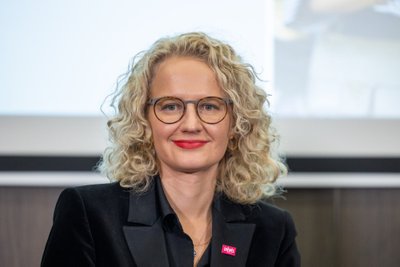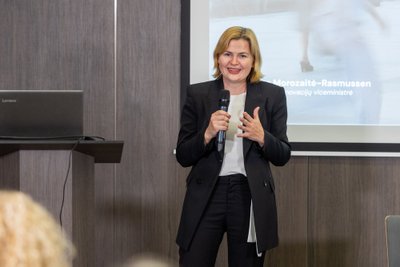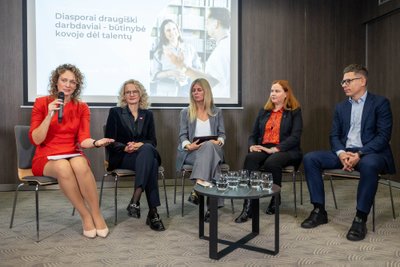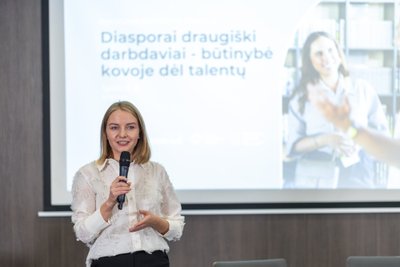"Our goal is to establish as many contacts as possible with Lithuanians living abroad and create the best conditions for them to return to Lithuania. One of the main factors stimulating this process is growing career opportunities and increasing salaries. The country's businesses and startups are actively contributing to this initiative, which will help improve the culture of international recruitment in Lithuania," said Aušrinė Armonaitė, Minister of Economy and Innovation.
The Diaspora-Friendly Employer initiative is just one of the measures that will help employees with various qualifications and skills to return and continue their careers in Lithuania more successfully. At the same time, the Minister is pleased that over the past four years, as many as 25 thousand more people have returned to Lithuania than have left the country.
„Most of the people returning to Lithuania are 25–40-year-old Lithuanians living abroad – active participants in the labour market, to whom our employers really have something to offer. Our task is to help them find each other,“ added Armonaitė.

Not everyone is aware of Diaspora-Friendly Employers
A survey conducted by Renkuosi Lietuvą (I Choose Lithuania) several years ago showed that our country’s employers still have many misconceptions about Lithuanians abroad. The research data reveals that employers tended to choose specialists who had acquired their education and work experience in Lithuania. Such decisions were driven by beliefs that working-age people returning from abroad have special requirements and find it more difficult to integrate into the labour market.
Vice Minister of the Economy and Innovation Neringa Morozaitė-Rasmussen says that Lithuanians living abroad, especially those who have been abroad for ten, fifteen, or more years, have also had a number of misconceptions about the Lithuanian labour market in terms of salaries, work culture, and opportunities for remote work.
„The reality is that many international companies already operate in Lithuania, Western work culture is also becoming the norm, and salaries are growing the fastest in the entire OECD,“ said Morozaitė-Rasmussen.
She noted that there is currently a talent shortage in both private businesses and the public sector, so employers are extremely flexible in their approach to the needs of returning Lithuanians.

„What would be better than hiring someone who knows the culture, feels sentiments for the country, has family and friends here, and could, therefore, quickly get involved in our labour market and stay here,“ noted the Vice Minister.
Last year, discussions were held between representatives of various state institutions, Lithuanian activists abroad, who are active in professional clubs, and business representatives about the difficulties of returning and integrating into the labour market and possible ways to resolve them.
These discussions were where the Diaspora-Friendly Employer badge initiative was born, the goal of which is to dispel existing myths, involve Lithuanians abroad in our labour market, and encourage business representatives to welcome returning compatriots.
Various state institutions, such as the Ministry of Foreign Affairs, the Ministry of Social Security and Labour, and diaspora organisations including the Lithuanian World Community and Global Lithuanian Leaders, have joined forces in this initiative.
Morozaitė-Rasmussen said that five criteria for a Diaspora-Friendly Employer have been established, but in order to obtain this status, it is sufficient to meet three of them.
Job selections are conducted remotely and/or remote workplaces are established by the company (employers announce remote work opportunities on their websites).
There’s an intercultural and inclusive work atmosphere (the company has an internal document declaring openness to cultures, equal rights, and other progressive provisions).
The ability to communicate in English – internally and externally (the company’s job advertisements are published in Lithuanian and English, and as internal communication in English is convenient for international employees, the company also has key internal documents in English).
The employer has established a clear onboarding process including a clear process for engaging in work activities and/or a mentoring system and providing new employees with an information and/or relocation information package for a smooth start in their new job.
There’s a flexible process for signing employment contracts and agreeing on a start date.

According to the Vice Minister, many companies already meet these criteria, they just need to make it public or make minimal changes, such as providing opportunities to apply for jobs remotely and translating documentation into English. English is very relevant for people who speak Lithuanian but have worked in international companies for many years, during which time, English has become their professional language.
Morozaitė-Rasmussen emphasised that this initiative is focused on both high-value and various other qualified employees.
„The employer that meets these criteria will attract not only Lithuanians abroad but also other young generation employees who are looking for an open, international, and favourable workspace,“ she stated with assuredness.
She pointed out that this initiative is not bureaucratically regulated and controlled, so it is very simple for both employers and job seekers. The employer must fill out the Diaspora-Friendly Employer declaration form, which is available on the Employment Service website. The employer will then receive a badge to show they meet the criteria, which will be displayed next to the job ads the employer uploads.
Lithuanian labour market not inferior to Western ones
Speaking about the Lithuanian labour market, Morozaitė-Rasmussen emphasised that Lithuanian businesses are already looking for specialists with international work experience.
„This is determined by the nature of our economy. Many of the goods produced in our country are exported. For example, the life sciences sector exports more than 90% of its production. Therefore, the experience of those who have worked in an international environment is very valuable both for employers and for the entire country’s economy,“ said the Vice Minister of Economy and Innovation.
She drew attention to those who have returned to the significantly changed environment in Lithuania: many international technology companies now operate in Lithuania, and Lithuanians abroad who have worked in Singapore, Silicon Valley in the US, or the financial centre of London are already returning to work in these companies. Such jobs, which used to be available only abroad, are now commonplace in Lithuania as well.
The Vice Minister is pleased that a startup ecosystem is successfully existing and growing in Lithuania, and many of them were founded by Lithuanians who returned from abroad and took up these activities after seeing excellent acceleration, incubation measures, and financing opportunities.

Integration of family members is a very important factor in deciding to return
For those considering returning to Lithuania, not only personal career prospects are of particular importance but also integration, learning, and work opportunities for children and partners or spouses (especially if they are not Lithuanians).
That is why the use of English in companies has been established as a criterion for a Diaspora-Friendly Employer – we are thinking not only of Lithuanians who have mastered professional English but also of their non-Lithuanian-speaking family members.
„Education is one of the most important issues for families returning. We are pleased that there are already a number of schools, not only in big cities but also throughout Lithuania, that have been receiving additional funding baskets for several years for the integration of Lithuanian children returning from abroad: a pupil may be assigned a remedial class or group. If there aren’t any schools with these offerings, due to the municipality, additional hours may be allocated for pupils to learn the Lithuanian language,“ added Morozaitė-Rasmussen.
She emphasised that when liaising with Lithuanians abroad, it is extremely important to provide them with all relevant information through a one-stop shop.
Currently, the portal www.griztu.lt contains information from all state institutions that may be relevant for those returning from abroad: from the pension transfer procedure and tax system to children’s education and business establishment opportunities.
Morozaitė-Rasmussen noted that caring for returning compatriots is not limited to information dissemination alone.
„On 1 July of this year, amendments to the Health Insurance Law came into force, which oblige non-working spouses of working foreigners and working Lithuanians to independently insure themselves with mandatory health insurance, enabling them to have the opportunity to access all health services. Previously, these persons did not have the opportunity to insure themselves and did not have access to all necessary health services,“ said the Vice Minister when discussing the very important change.
In addition, centralised and fast immigration, integration services, and high-quality service can be accessed at the International House in Vilnius and Klaipėda.
